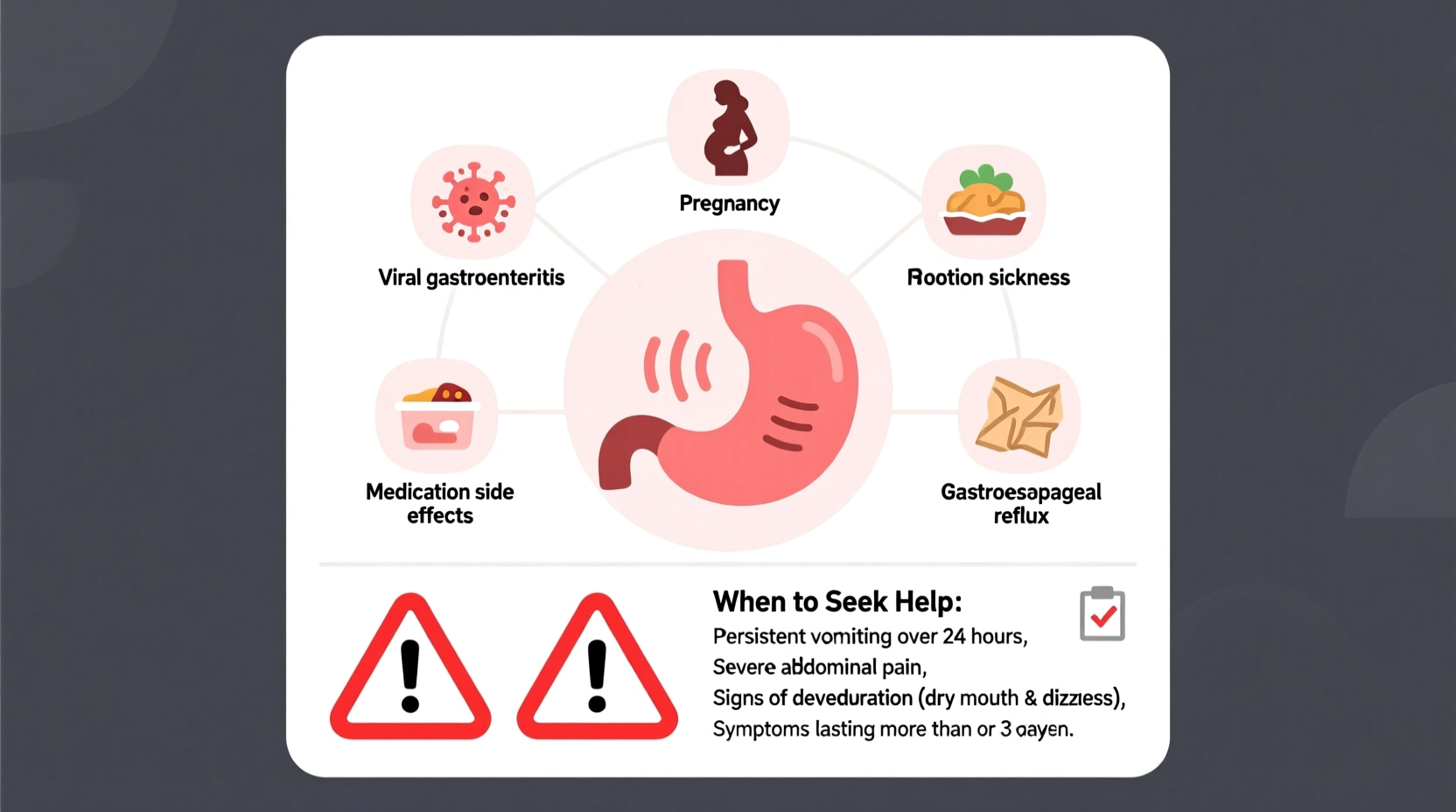Nausea is a familiar sensation—most people experience it occasionally due to motion sickness, eating something off, or stress. But when nausea becomes constant or persists for days, it may signal an underlying health issue that requires attention. Unlike transient queasiness, chronic nausea disrupts daily life, affects nutrition, and can be emotionally draining. Understanding the root causes and knowing when to seek help are essential steps toward relief and recovery.
What Is Constant Nausea?

Constant nausea refers to a persistent feeling of needing to vomit that lasts for hours, days, or even weeks. It’s not always accompanied by vomiting, but the discomfort can be relentless. While occasional nausea often resolves on its own, ongoing symptoms suggest a deeper physiological or psychological trigger. The digestive system, nervous system, inner ear, and hormonal balance all play roles in regulating nausea, so dysfunction in any of these areas can contribute.
Because nausea is a symptom rather than a diagnosis, identifying the cause is crucial. Some triggers are benign and temporary, while others point to serious conditions requiring prompt intervention.
Common Causes of Persistent Nausea
Several systems in the body influence the sensation of nausea. Below are some of the most frequent contributors to constant nausea:
- Gastrointestinal disorders: Conditions like gastroparesis (delayed stomach emptying), gastroesophageal reflux disease (GERD), peptic ulcers, or irritable bowel syndrome (IBS) can lead to chronic nausea.
- Pregnancy: Morning sickness, especially in the first trimester, often includes persistent nausea. In severe cases, it may develop into hyperemesis gravidarum.
- Migraines: Vestibular migraines or abdominal migraines can present primarily with nausea, sometimes without head pain.
- Medications: Chemotherapy drugs, opioids, antibiotics, and certain antidepressants list nausea as a common side effect.
- Inner ear issues: Disorders such as Meniere’s disease or vestibular neuritis affect balance and frequently cause prolonged nausea.
- Metabolic imbalances: Kidney failure, liver disease, or uncontrolled diabetes (especially diabetic ketoacidosis) can trigger persistent nausea.
- Psychological factors: Anxiety, depression, and chronic stress activate the gut-brain axis, leading to functional nausea.
- Cancer and tumors: Brain tumors, pancreatic cancer, or gastrointestinal cancers may present with unexplained, ongoing nausea.
When to Seek Medical Help
While mild nausea may resolve with rest and hydration, certain red flags indicate the need for immediate evaluation. Delaying care in such cases can lead to complications like dehydration, malnutrition, or worsening of underlying disease.
“Persistent nausea without a clear cause should never be ignored. It’s the body’s way of signaling that something is out of balance.” — Dr. Lena Patel, Gastroenterologist
Warning Signs That Require Prompt Attention
| Symptom | Potential Implication | Action Required |
|---|---|---|
| Vomiting blood or material resembling coffee grounds | Gastrointestinal bleeding | Seek emergency care |
| Inability to keep fluids down for over 24 hours | Dehydration risk | Visit urgent care or ER |
| Severe abdominal pain or distension | Bowel obstruction or pancreatitis | Immediate evaluation needed |
| Headache with vision changes or confusion | Possible neurological issue | Go to emergency department |
| Unintentional weight loss with ongoing nausea | Potential malignancy | Schedule prompt doctor visit |
Diagnosis and Evaluation Process
Diagnosing the cause of constant nausea involves a systematic approach. Your healthcare provider will likely begin with a detailed history, including medication use, dietary habits, mental health status, and associated symptoms.
Diagnostic tools may include:
- Blood tests: To check liver function, kidney health, electrolyte levels, and signs of infection or inflammation.
- Imaging: Abdominal ultrasound, CT scan, or MRI to evaluate organs and detect structural abnormalities.
- Endoscopy: If a GI disorder is suspected, a scope may examine the esophagus, stomach, and upper intestine.
- Vestibular testing: For suspected inner ear involvement.
- Psychological assessment: When no physical cause is found, anxiety or somatic symptom disorder may be contributing.
Step-by-Step: What to Expect During a Medical Visit
- Initial consultation: Discuss symptoms, duration, triggers, and impact on daily life.
- Physical exam: Focus on abdomen, neurological function, and vital signs.
- Testing: Blood work and imaging ordered based on suspicion.
- Specialist referral: May involve gastroenterology, neurology, or ENT depending on findings.
- Treatment trial: Short-term medication or dietary changes to assess response.
Real-Life Example: A Case of Misdiagnosed Nausea
Sarah, a 42-year-old teacher, experienced nausea every morning for six weeks. She assumed it was stress-related and tried over-the-counter remedies. When she began losing weight and developed bloating after meals, she consulted her doctor. Initial tests showed mild gastritis, but symptoms persisted despite treatment. Further investigation revealed delayed gastric emptying—gastroparesis—linked to undiagnosed type 2 diabetes. With proper glucose management and dietary adjustments, her nausea gradually improved.
Sarah’s case illustrates how persistent nausea can mask systemic illness. Early assumption and self-treatment delayed the correct diagnosis, emphasizing the importance of professional evaluation when symptoms endure.
Managing Nausea at Home: Practical Tips
While treating the underlying cause is paramount, supportive strategies can ease symptoms in the meantime:
- Eat small, frequent meals instead of large ones.
- Avoid greasy, spicy, or strongly scented foods.
- Stay hydrated with clear fluids like water, broth, or oral rehydration solutions.
- Rest in an upright position after eating to reduce reflux.
- Use acupressure wristbands, which some find helpful for motion-related nausea.
FAQ: Common Questions About Constant Nausea
Can anxiety really cause constant nausea?
Yes. The gut and brain are closely connected through the vagus nerve and neurotransmitters like serotonin. Chronic anxiety can disrupt digestion, leading to nausea, bloating, and altered motility. This is often seen in functional gastrointestinal disorders like IBS.
Is it normal to feel nauseous every day during pregnancy?
Many pregnant individuals experience daily nausea, especially in the first trimester. However, if vomiting is severe, leads to weight loss, or causes dizziness, it could be hyperemesis gravidarum—a condition requiring medical treatment to prevent dehydration and nutritional deficits.
Can medications cause nausea even if I’ve taken them for months?
Yes. Some drugs cause delayed side effects or interact with new medications. Additionally, organ function (like liver or kidney health) can change over time, affecting how your body processes medication and increasing sensitivity to side effects.
Checklist: When to Contact a Healthcare Provider
- ☑ Nausea lasting more than 48 hours without improvement
- ☑ Vomiting that prevents fluid intake
- ☑ Unexplained weight loss
- ☑ New or worsening abdominal pain
- ☑ Dizziness, confusion, or rapid heartbeat
- ☑ History of diabetes, cancer, or gastrointestinal disease
- ☑ Starting a new medication coinciding with symptoms
Conclusion: Take Control of Your Health
Constant nausea is more than an inconvenience—it’s a signal from your body that deserves attention. While some causes are manageable with lifestyle changes, others require timely diagnosis and treatment. Ignoring persistent symptoms can lead to avoidable complications. Whether it’s adjusting medication, managing stress, or investigating a hidden condition, taking action early improves outcomes.









 浙公网安备
33010002000092号
浙公网安备
33010002000092号 浙B2-20120091-4
浙B2-20120091-4
Comments
No comments yet. Why don't you start the discussion?